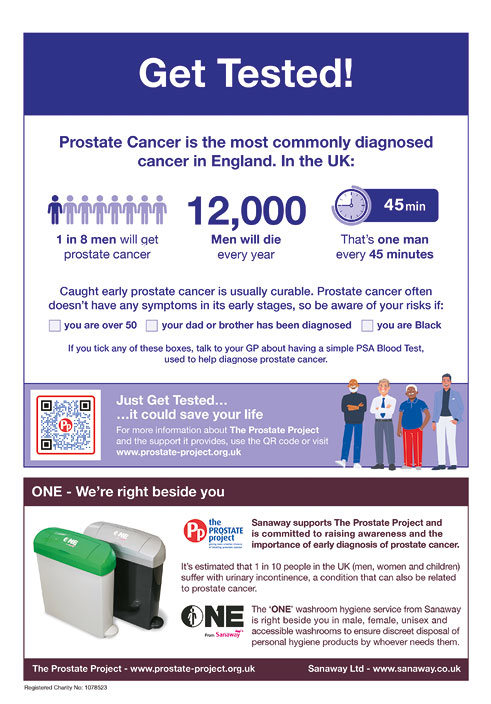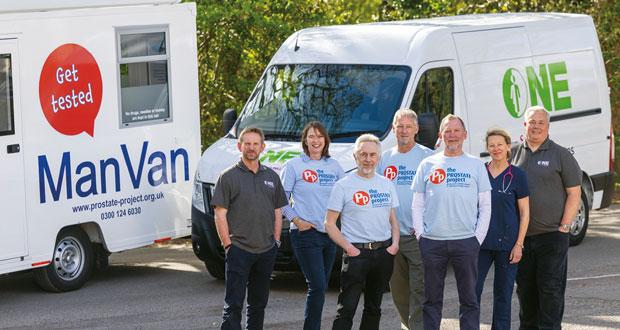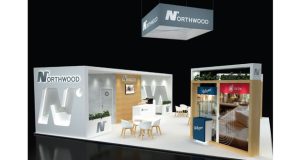WASHROOMS & WELLBEING
Achieving ESG is more than environmental sustainability and waste services providers can also help support occupant wellbeing. For us, it means providing an inclusive workplace personal hygiene service.
While washroom legislation has traditionally focussed on female sanitary provision, it’s perhaps less known that an estimated one in 10 people suffer with urinary incontinence in the UK, and men, women and children can all be affected.
We encourage businesses to develop a more inclusive approach by providing unisex hygiene disposal units in all washrooms. These can be used by anyone experiencing urinary incontinence issues, which may be related to conditions such as the menopause, a stroke, dementia, obesity and prostate cancer, or because of disability and certain neurological conditions. The use of some medications may also cause temporary incontinence issues.
In addition, as prostate cancer is now the most diagnosed cancer in England and one in eight men (one in four if Black) in the UK will get prostate cancer in their lifetime, there is an increasing need for businesses to provide hygiene bins in male washrooms to dispose of incontinence products.
Sanaway’s ONE service was developed to support this approach and help businesses normalise the presence and use of a universal hygiene unit that can be used by everyone who needs them, regardless of whether they use male, female, unisex or accessible washroom facilities.
 Washrooms offer a discreet and effective setting for sharing accurate health information and directing employees to relevant support services. Common topics include menopause, prostate health, and mental wellbeing, often supported by partnerships with specialist charities.
Washrooms offer a discreet and effective setting for sharing accurate health information and directing employees to relevant support services. Common topics include menopause, prostate health, and mental wellbeing, often supported by partnerships with specialist charities.
Our relationship with The Prostate Project enables us to provide businesses with accurate health information to display in washrooms on the various risk factors for getting prostate cancer, as well as highlighting the importance of taking a simple PSA test for early prostate cancer detection. Customers are also encouraged to offer a PSA blood test to male employees via The Prostate Project’s mobile testing facility, The Man Van, as early detection can ultimately help save lives.
Businesses may also like to consider making personal hygiene products accessible to employees free of charge in all washrooms.
CHOOSING A PROVIDER
When considering a washroom provider to help meet sustainability goals FMs may cite such as reducing water consumption, minimising waste production, and using eco-friendly products. This means clearly defining what sustainability means to your organisation, which elements are non-negotiable, and where there’s room for flexibility especially in the context of budget constraints.
Questions to ask might include:
- Does the zero waste to landfill service rely on incineration only, or incorporate EFW as well to utilise by-products of incineration?
- Is your zero waste to landfill service fully auditable? This will evidence responsible waste disposal as well as provide a benefit for clients with ISO 14001 by helping to fulfil their continuous improvement requirement.
- Can we visit your EFW facility? This will reassure you how the process works from the moment your waste draws up to the gates and journeys through the process to the end.
- What steps are taken to minimise carbon footprint? For example, is least distance route planning utilised.
- Are bin sizes and service frequencies tailored to your needs? Smaller bins may require more frequent visits, raising costs and carbon footprint. A full audit ensures the right setup for efficiency and sustainability.
- Are products and consumables responsibly sourced, reusable, recyclable and kind to the environment?
Finally, ask your supplier to provide you with direct contact to their existing clients who are happy to discuss their service experience. If there is an unwillingness to allow this first-hand contact, you can make a considered choice to look for an alternative supplier.





